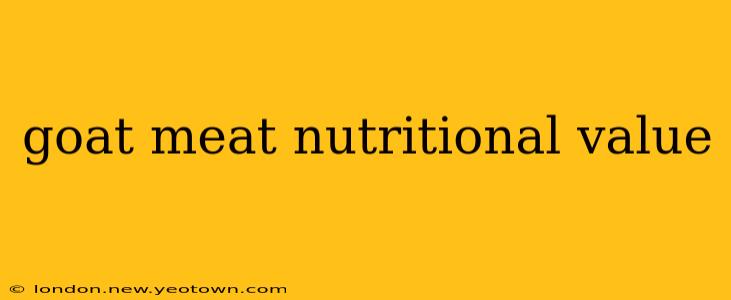Goat meat, also known as chevon, is a lean, flavorful red meat enjoyed globally for centuries. Beyond its delicious taste, goat meat boasts a remarkable nutritional profile packed with essential vitamins and minerals. Let's delve into the details, exploring why this often-underestimated protein source deserves a prominent place in your diet.
What are the nutritional benefits of goat meat?
Goat meat is a fantastic source of high-quality protein, crucial for building and repairing tissues, supporting immune function, and producing enzymes and hormones. A 3-ounce serving provides roughly 25 grams of protein, comparable to beef or chicken. However, unlike some other red meats, goat meat is notably lower in fat, particularly saturated fat, making it a healthier choice for those watching their cholesterol levels. It's also a good source of iron, essential for carrying oxygen throughout the body and preventing anemia. Furthermore, goat meat offers a decent amount of vitamin B12, vital for nerve function and red blood cell production. The presence of zinc contributes to immune function and wound healing, and selenium acts as an antioxidant, protecting cells from damage.
Is goat meat healthier than other red meats?
This is a question often asked, and the answer is nuanced. While all red meats contain varying levels of saturated fat, goat meat generally contains less than beef or lamb. This makes it a potentially healthier alternative for individuals concerned about heart health. However, the overall health benefits depend on how the goat meat is prepared. Fatty cuts and methods like deep-frying can negate the advantages of its naturally leaner composition. Ultimately, moderation and healthy cooking methods are key regardless of the red meat chosen.
How much protein is in goat meat?
As mentioned previously, a 3-ounce serving of goat meat typically contains around 25 grams of protein. This makes it a significant contributor to your daily protein intake, especially important for athletes, individuals recovering from illness, or those seeking to maintain muscle mass. The high protein content also promotes satiety, helping you feel fuller for longer and potentially aiding in weight management.
What are the potential health risks of eating goat meat?
While generally safe and nutritious, goat meat, like any other meat, carries some potential risks. Parasites are a possibility if the meat isn't properly handled and cooked. Thorough cooking to an internal temperature of 160°F (71°C) is essential to eliminate any potential health hazards. Additionally, individuals with a history of gout or kidney stones may need to moderate their consumption due to the purine content found in goat meat. As with any dietary change, consulting a healthcare professional or registered dietitian is advisable, particularly for those with specific health concerns.
Is goat meat high in cholesterol?
Compared to other red meats, goat meat is relatively lower in cholesterol. However, the cholesterol content can still vary depending on the cut and the animal's diet and age. While the lower cholesterol content is a plus, it's vital to remember that a balanced diet and regular exercise remain crucial for maintaining healthy cholesterol levels. Focusing on lean cuts and preparing the meat in healthy ways contributes significantly to minimizing any potential negative impact.
Conclusion:
Goat meat offers a delicious and nutritious alternative to other red meats. Its lean profile, high protein content, and rich supply of essential vitamins and minerals make it a valuable addition to a healthy and balanced diet. However, responsible sourcing, proper cooking, and mindful consumption are crucial to maximizing its health benefits and minimizing any potential risks. Remember to consult with a healthcare professional or registered dietitian to determine the best way to incorporate goat meat into your individual dietary needs.

